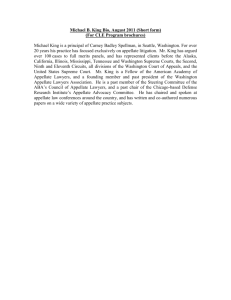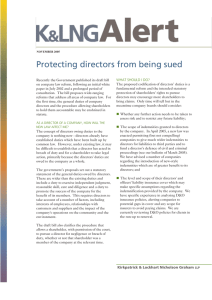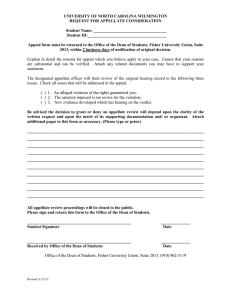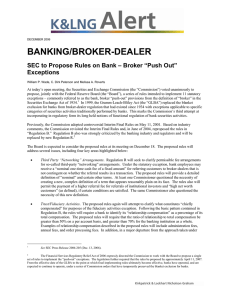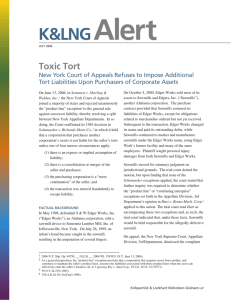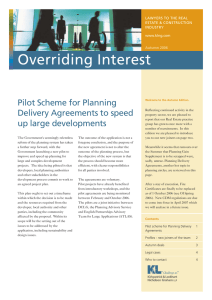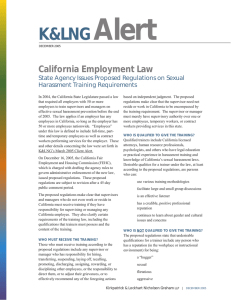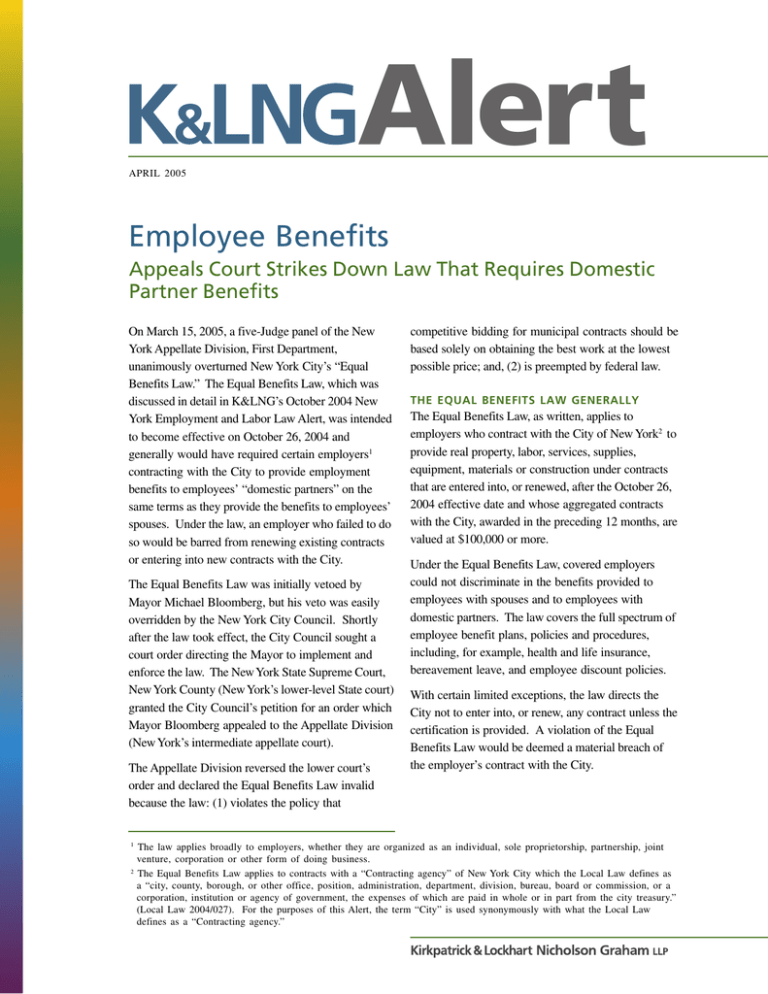
APRIL 2005
Employee Benefits
Appeals Court Strikes Down Law That Requires Domestic
Partner Benefits
On March 15, 2005, a five-Judge panel of the New
York Appellate Division, First Department,
unanimously overturned New York City’s “Equal
Benefits Law.” The Equal Benefits Law, which was
discussed in detail in K&LNG’s October 2004 New
York Employment and Labor Law Alert, was intended
to become effective on October 26, 2004 and
generally would have required certain employers1
contracting with the City to provide employment
benefits to employees’ “domestic partners” on the
same terms as they provide the benefits to employees’
spouses. Under the law, an employer who failed to do
so would be barred from renewing existing contracts
or entering into new contracts with the City.
The Equal Benefits Law was initially vetoed by
Mayor Michael Bloomberg, but his veto was easily
overridden by the New York City Council. Shortly
after the law took effect, the City Council sought a
court order directing the Mayor to implement and
enforce the law. The New York State Supreme Court,
New York County (New York’s lower-level State court)
granted the City Council’s petition for an order which
Mayor Bloomberg appealed to the Appellate Division
(New York’s intermediate appellate court).
The Appellate Division reversed the lower court’s
order and declared the Equal Benefits Law invalid
because the law: (1) violates the policy that
1
2
competitive bidding for municipal contracts should be
based solely on obtaining the best work at the lowest
possible price; and, (2) is preempted by federal law.
THE EQUAL BENEFITS LAW GENERALLY
The Equal Benefits Law, as written, applies to
employers who contract with the City of New York2 to
provide real property, labor, services, supplies,
equipment, materials or construction under contracts
that are entered into, or renewed, after the October 26,
2004 effective date and whose aggregated contracts
with the City, awarded in the preceding 12 months, are
valued at $100,000 or more.
Under the Equal Benefits Law, covered employers
could not discriminate in the benefits provided to
employees with spouses and to employees with
domestic partners. The law covers the full spectrum of
employee benefit plans, policies and procedures,
including, for example, health and life insurance,
bereavement leave, and employee discount policies.
With certain limited exceptions, the law directs the
City not to enter into, or renew, any contract unless the
certification is provided. A violation of the Equal
Benefits Law would be deemed a material breach of
the employer’s contract with the City.
The law applies broadly to employers, whether they are organized as an individual, sole proprietorship, partnership, joint
venture, corporation or other form of doing business.
The Equal Benefits Law applies to contracts with a “Contracting agency” of New York City which the Local Law defines as
a “city, county, borough, or other office, position, administration, department, division, bureau, board or commission, or a
corporation, institution or agency of government, the expenses of which are paid in whole or in part from the city treasury.”
(Local Law 2004/027). For the purposes of this Alert, the term “City” is used synonymously with what the Local Law
defines as a “Contracting agency.”
GROUNDS FOR STRIKING DOWN THE EQUAL
BENEFITS LAW
The Appellate Division, in reversing the lower court’s
order, found that the Equal Benefits Law was invalid.
Specifically, the Appellate Division found that the
Equal Benefits Law “impermissibly runs afoul” of the
policy underlying the state law’s competitive bidding
provisions which are also applicable to municipalities.
Those provisions, said the Appellate Division, “seek
to protect the public fisc by obtaining the best work at
the lowest possible price … .” The Equal Benefits
Law, by contrast, “expressly excludes a class of
potential bidders for a reason unrelated to the quality
or price of the goods or services they offer.” The
Appellate Division stated that “the City Council
cannot achieve even laudable goals by making illegal
what is specifically allowed by state law.”
The Appellate Division also held that the Equal
Benefits Law is preempted by the Federal Employee
Retirement Income Security Act. ERISA – which does
not require domestic partner coverage – supersedes
all state or municipal laws that relate to any employee
benefit plan under its purview (e.g. health insurance
and pension plans). Because the Equal Benefits Law
“mandates employee benefit structures or their
administration,” the Appellate Division found that “it
is connected with a core concern of ERISA,
impermissibly interferes with [ERISA’s] goal of
uniform plan administration, and is thus preempted.”
Even if the Court of Appeals reverses the Appellate
Division’s ruling and orders enforcement of the Equal
Benefits Law, the law could still be challenged in
federal court on the ERISA preemption grounds.
Employers doing business with the City should
continue to closely monitor the legal status of the
Equal Benefits Law. If, on further appeal, the City
Council successfully obtains an order directing the
Mayor to enforce the Equal Benefits Law, those
employers should review their benefit plans and, after
considering federal challenges to the law, determine
the appropriate strategy in order to renew City
contracts or bid for new work.
David E. Morse
dmorse@klng.com
(212) 536-3998
Daniel J. Doron
ddoron@klng.com
(212) 536-3947
Although not addressed by the Appellate Division, an
additional basis for a potential challenge to the Equal
Benefits Law may exist in that the Equal Benefits Law
could arguably be found to violate the “contracts
clause” of the United States Constitution if it impairs
existing collective bargaining agreements by
materially changing the cost of providing employee
benefits. Such an impairment might be found when a
City contract is up for renewal while a collective
bargaining agreement is in effect.
CONCLUSION
The City Council intends to appeal the Appellate
Division’s ruling to New York’s highest appellate
court, the Court of Appeals. As of the date of this Alert,
however, that appeal has not yet been filed.
2 APRIL 2005
KIRKPATRICK & LOCKHART NICHOLSON GRAHAM LLP
If you have questions or would like more information about K&LNG’s Employee Benefits practice,
please contact one of our lawyers listed below:
Boston
Stephen E. Moore
617.951.9191
smoore@klng.com
Los Angeles
William P. Wade
310.552.5071
wwade@klng.com
New York
David E. Morse
212.536.3998
dmorse@klng.com
Pittsburgh
Charles R. Smith
412.355.6536
csmith@klng.com
San Francisco
Laurence A. Goldberg
415.249.1043
lgoldberg@klng.com
Washington
William A. Schmidt
202.778.9373
william.schmidt@klng.com
www
w.. k l n g . c o m
BOSTON
■
DALLAS
■
HARRISBURG
■
LONDON
■
LOS ANGELES
■
MIAMI
■
NEWARK
■
NEW YORK
■
PITTSBURGH
■
SAN FRANCISCO
■
WASHINGTON
Kirkpatrick & Lockhart Nicholson Graham LLP (K&LNG) has approximately 950 lawyers and represents entrepreneurs, growth and middle market
companies and leading FORTUNE 100 and FTSE 100 global corporations nationally and internationally.
K&LNG is a combination of two limited liability partnerships, each named Kirkpatrick & Lockhart Nicholson Graham LLP, one qualified in Delaware, U.S.A.
and practicing from offices in Boston, Dallas, Harrisburg, Los Angeles, Miami, Newark, New York, Pittsburgh, San Francisco and Washington and one
incorporated in England practicing from the London office.
This publication/newsletter is for informational purposes and does not contain or convey legal advice. The information herein should not be used or relied
upon in regard to any particular facts or circumstances without first consulting a lawyer.
Unless otherwise indicated, the lawyers are not certified by the Texas Board of Legal Specialization.
Data Protection Act 1988 - We may contact you from time to time with information on Kirkpatrick & Lockhart Nicholson Graham LLP seminars and with our
regular newsletters, which may be of interest to you. We will not provide your details to any third parties. Please e-mail cgregory@klng.com if you would
prefer not to receive this information.
© 2005 KIRKPATRICK & LOCKHART NICHOLSON GRAHAM LLP. ALL RIGHTS RESERVED.



